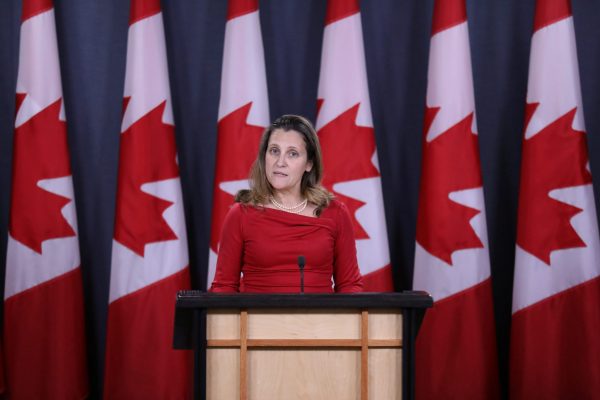The December 2018 arrest of Huawei Chief Financial Officer Meng Wangzhou by Canadian Border Services agents acting on a US extradition request triggered a free fall in Canada–China relations. There is no end date in sight for Meng’s time in Canada as extradition processes will extend over months if not years. Nor is there any timeline for the release of the two Canadians jailed in retaliation by Chinese authorities for allegedly ‘stealing state secrets’. Beijing has also imposed trade sanctions, blocking key Canadian agricultural exports.
Ottawa insists that Meng’s case is a ‘rule of law’ matter and views the ‘targeted abduction’ of its citizens as violations of international diplomatic practice and human rights norms. Its campaign to enlist like-minded states to pressure China was boosted by support from US Secretary of State Mike Pompeo. This further intensified China’s retaliation as Beijing charged Ottawa with playing ‘a disgraceful role’ in a ‘duet’ with the United States.
Canada–China relations are further complicated by developments on two other fronts. First is Ottawa’s pending decision concerning Huawei’s participation in the development of 5G networks. Washington has implied that Canada would jeopardise the sharing of Five Eyes intelligence if it did not join it in blocking Huawei. The Canadian security and corporate communities are divided in their interests and views as several major Canadian telecommunications providers have substantial investments in Huawei equipment.
Second, the ongoing pro-democracy demonstrations in Hong Kong have repercussions for Canada as Canadians constitute the largest diaspora in the city. Ottawa will be caught up in substantial logistical and legal challenges should instability continue to mount and larger numbers of individuals seek to leave, especially those involved in anti-government protests. Beijing has already accused the Canadian Foreign Affairs Minister of meddling in China’s internal affairs following her condemnation of violence associated with past demonstrations.
Currently there appears little more that Ottawa can accomplish. The Trudeau government will postpone any action that would incite negative responses from either capital. Reengagement with Beijing will be a long process that will continue to be susceptible to the vagaries of the overarching US–China relationship.
Canada and other US regional allies find dealing with Washington frustrating. Personal and summit diplomacy with US President Donald Trump has achieved mixed results and continues to be susceptible to asymmetric pressure tactics and unexpected reversals.
As a middle power, Canada’s ability to influence major powers is limited. Unilateral retaliatory action and actions through multilateral institutions against China or the United States are off the cards. The G7, G20, UN, the ASEAN Regional Forum and APEC are yet to adopt public statements on behalf of Canada. This indicates the limited extent to which today’s middle powers are collectively able and willing to take stances unpopular with one or both major powers.
The complexities of Canada’s entanglement with China and the United States highlight the prospects and constraints for middle powers and small states in today’s increasingly fraught international order. Middle powers will look to circumvent polarisation of their security and economic relationships by employing hedging strategies such as selectively balancing their individual engagement in bilateral alliances and multinational arrangements. They will also look to employ collective diplomacy to keep both China and the United States engaged in regional and global multilateral institutions.
Middle powers must come to terms with needing to define their own multilateral agendas and combining forces in issue-based coalitions of the like-minded where one or both of China and the United States is absent.
The Trudeau government has focussed its efforts on trade enhancement and diversification through bilateral FTAs and multilateral trade arrangements. It seeks to counter the onslaught of the international trade regime and multilateral institutions through creative coalition efforts. For example, it is negotiating with the European Union for a solution to circumvent Washington’s efforts to paralyse the Appellate Board of the WTO.
Along with other middle powers, Ottawa has sought common cause at the global level through international organisations and forums to address the broad spectrum of non-traditional security concerns and bolster multilateralism through global initiatives such as the Paris Agreement on climate change. Yet prospects for middle power leadership and institutional progress on these issues cannot be taken for granted, only in part due to the Trump administration’s obstructionism.
Middle powers, particularly Australia, South Korea and Canada, face the overarching challenge of advancing principles of rules-based ordering. They must simultaneously engage an authoritarian China, and deal with an anti-multilateralism United States that seeks to dismantle or cripple global institutions.
Most fundamentally, middle powers must come to terms with the reality that the foundations of the ‘Western liberal’ rules-based international order are being challenged. They are threatened by internal forces of anti-globalisation and nationalism as well as external forces, like China, that seek to implement an alternative rules-based order.
Middle powers will require adept diplomacy to navigate between major power expectations of followership while sustaining one’s own norms and values. They must avoid being caught, as Canada currently finds itself, between a proverbial rock and a hard place.
Brian L Job is Professor of political science and an affiliated faculty member with the School of Public Policy and Global Affairs at the University of British Columbia.

